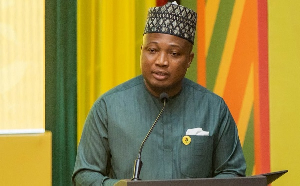Accra, Nov. 23, GNA-The notion that the current 2.2 percent national prevalence rate of HIV/AIDS pandemic in Ghana was nothing to warrant worrying about should be discarded and rather be given urgent attention, says Prof Fred Sai, Presidential Special Advisor on HIV/AIDS.
He noted that, other countries, who have currently attained national prevalence rates of between 20 and 30 percent started with the same pattern, therefore prevention, treatment, care and intensified education should rather be given priority to reduce the rate of new infections and bring Ghana's figure further down. Prof. Sai, who was addressing a sensitization workshop on HIV/AIDS for journalists on Friday, said the current lifestyles of most Ghanaians, especially men gave an impression that either they did not care about their families or they were simply being selfish. He said many people had rejected HIV/AIDS testing or counselling because they do not believe in its existence in spite of continuous education.
Prof. Sai said the fact that people do not believe in the existence of the disease does not make it go away, saying, "their belief is just an elusion and the earlier they come into terms with the realities, the better it would be for all humanity." He challenged the media to the task of intensified and re-structured reportage to make messages real and challenging to their audience.
Over 50 journalists from the various media houses in Accra participated in the workshop, organised by the UN Systems in Ghana, under the theme; AIDS Response in Ghana-Role of the Media. Prof. Sai said though the media had played a major role in public education on HIV/AIDS in the country, the was the need to provide them with apt information on current trends so that they could best inform on vital issues for the realization of the Millennium Development Goals (MDG).
He said HIV/AIDS was a real situation, which had devastating implications on all aspects of society including socio-economic, health, cultural and political and was currently depleting the power of the working force in the country.
"In Sub-Saharan Africa alone it is believed that about 68 percent of the population was infected, but the sad aspect of the situation is that women form the highest number of cases; meaning men were acting irresponsibly," he said.
Prof. Sai said the media was therefore a very effective tool to ensure a very sustained national HIV/AIDS response; therefore they must be given every possible insight into the available policies, programmes and strategies so that they could make the best impact. He also challenged journalists to research more on trends of the pandemic in order to make their stories interesting and appealing to their audience.
"Most media messages on HIV/AIDS are often dropped out of the editor's selections of daily publications because they are not appealing, interesting or catchy enough which they think would not make any sale for the particular media house," he said. He also urged the media to intensify education on the various policies and frameworks, which leads to discrimination, abuses of rights of People Living with HIV/AIDS (PLWHAS) and stigmatization and also give free media slots for HIV/AIDS education in daily publications and broadcasting.
Prof. Sai called for effective collaboration of all stakeholders, especially the media, to better plan strategies, inform and educate the public on the disease. Dr Joaquim Saweka, WHO Country Representative and Chairman, UN Theme Group on HIV/AIDS expressed worry about the fact that the disease was spreading wildly among the youth, particularly young women, yet most societies were playing ignorance and doing very little to change their lifestyles.
He appealed to the media as partners in education to help break the issue of stigma by using the right kind of languages in their reportage, desist from sensationalizing HIV/AIDS issues or creating panic and fear by giving wrong statistics and focus on encouraging Voluntary Counselling and Testing (VCTs) to help stem the tide of new infections. "We must know the right type of language to use when reporting on HIV/AIDS to help bring confidence to help the marginalized," he said. 23 Nov. 07
Health News of Friday, 23 November 2007
Source: GNA












